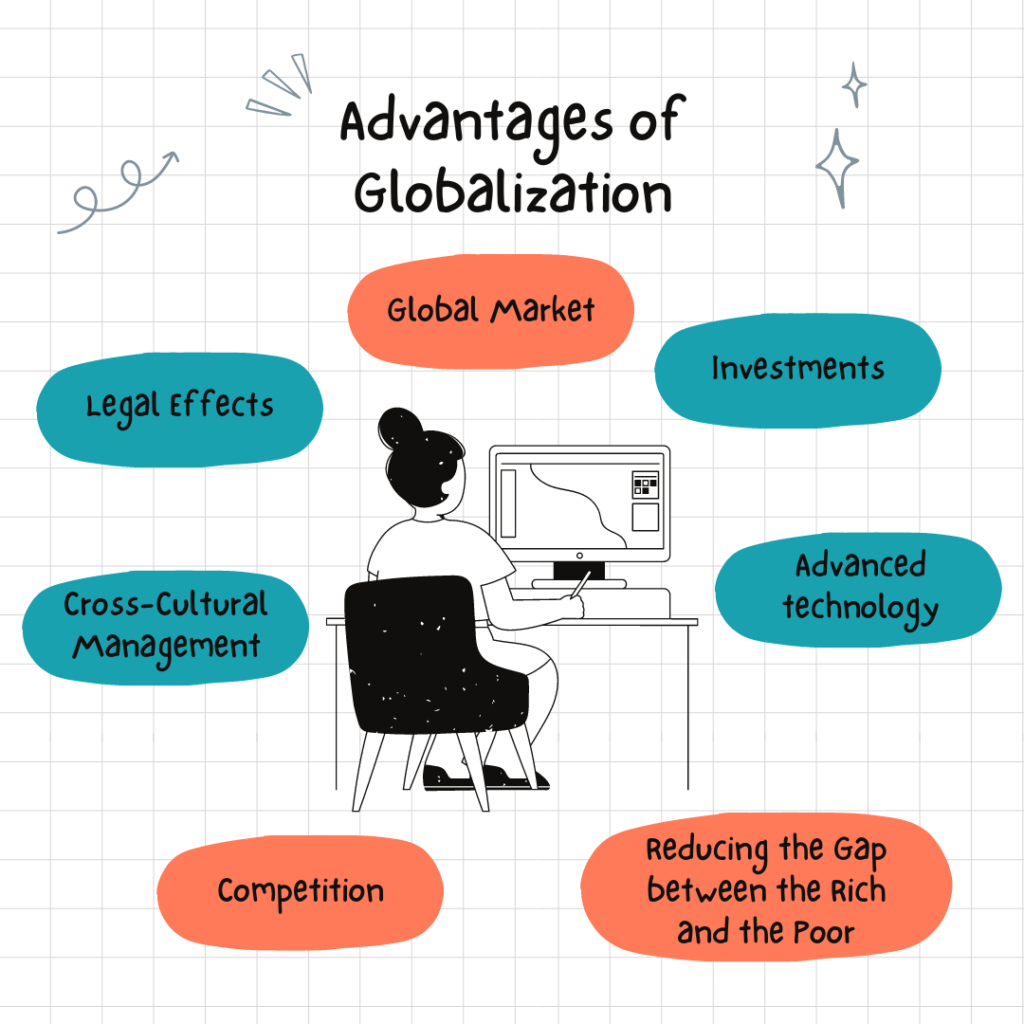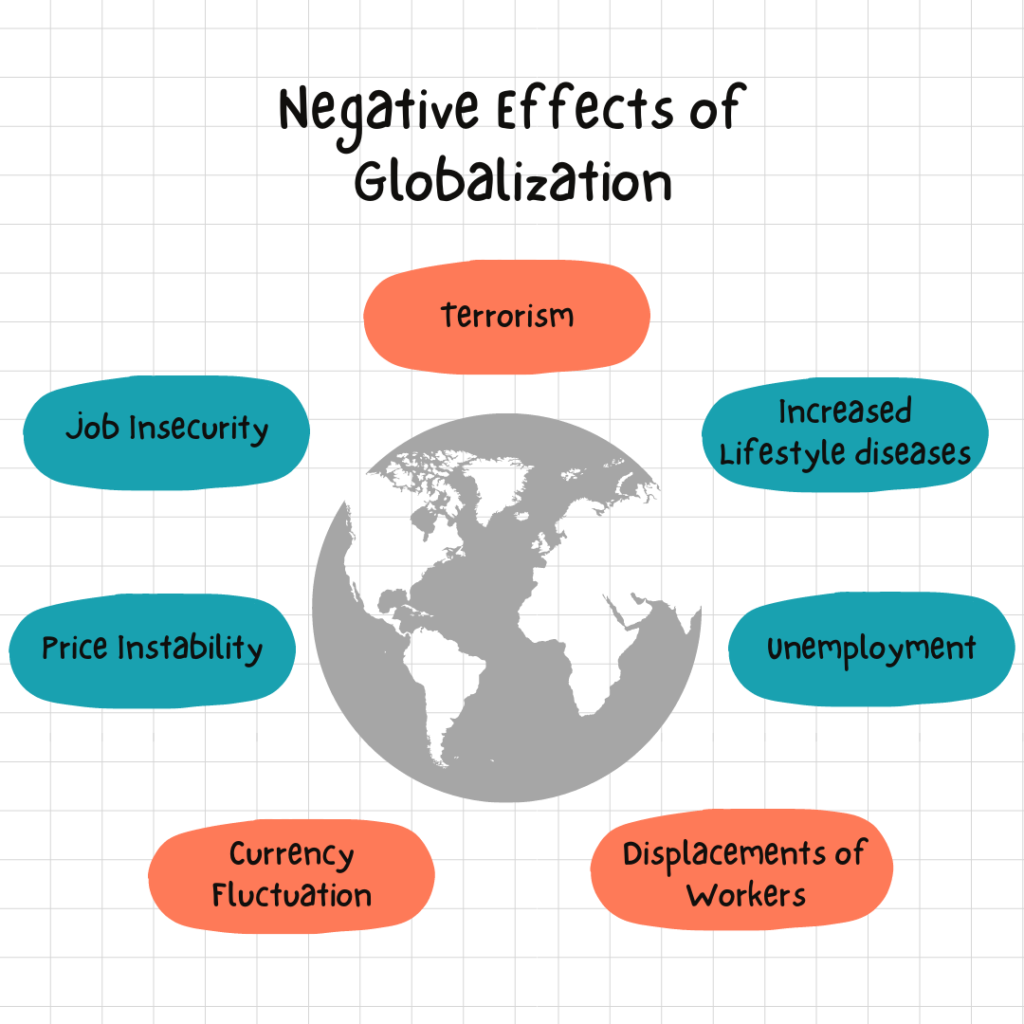Executive Summary
This report deals with the positive and negative effects of globalization. When we’re talking about it, we mean the process of self-integration of countries due to an impact of intergovernmental organizations (IGOs) and non-governmental organizations (INGOs). Generally, it involves economic integration and political interaction as it’s connected to the cultural and social aspects of different nations.
Researchers distinguish several dimensions of globalization, chiefly among them they emphasize on political, social, and economic models. The modern political approach pertains to the coordination and cooperation between different governments. National partnerships were primarily created to overcome such global problems as wars, diseases, hunger, and environmental pollution. The social approach deals with human interaction as social media and the Internet allow people to communicate without barriers. For instance, everybody knows about the American dream, Russian ballet, or Chinese professional chess players since information spreads very fast. An economic dimension pertains to commercial corporations. They have headquarters worldwide which allow them to influence particular domestic policy.
This report provides an extensive approach to world integration revealing both the pros and cons of its worldwide influence. It explains how our world became a global village where everyone who has access to the Internet can purchase products and services. People can also be employed and work remotely without the hustle of traveling and settling in a foreign state.
What is more, this article highlights both negative and positive globalization effects which take place in developed countries as well as those which are just developing. Student exchanges are of great value for both of these groups. It is possible to study online and achieve a degree without having to relocate to a foreign state. Most business people use this available means of interaction to get in touch with directors as well as CEO’s of successful traders to invest their money and discuss possible profits and dividends.
This paper also gives an opinion on disadvantages, for instance, employment shifts or wage gaps. Job hunting became a multinational trend. The most affected employees are those from developed countries as employers can hire immigrants who have smaller salaries. Several thousand local companies go bankrupt each year as a result of price fluctuations. States which have access to cheap raw materials and labor sell their products at a low cost via online platforms. This results in bringing down various companies which are pressured to decrease prices and obtain minimum profits.
Our fundamental issue is how to utilize the advantages of worldwide integration and minimize its disadvantages. It’s evident that the positive influence outweighs the negative, but it seems to affect dramatically common daily life. For instance, in some developed countries, a couple have several part-time jobs almost around the clock to pay for their mortgage, car loan, and afford basic needs. In such cases, states should raise their minimum wages or ensure employers don’t hire remote workers abroad.
Introduction
Globalization describes how different world cultures, populations, and economies are interdependent from each other. It is a consequence of cross-border business. Technology, goods, investments, information, and services along with the labor market are the most popular components of such activity. Nations have established worldwide integration over many centuries by enabling economic, political, and social partnerships.
In ancient times people moved to distant places to settle, exchange goods with others, and to produce food and unprocessed materials. In the early 19th century, trains, steamships, and telegraphs opened the way to global interaction and integration through economic collaboration among states. Global trade was affected by World War I and II, the post-war protectionism and the Great Depression. Many countries were affected economically, and there was an increased rivalry between various nations. Today the same endeavor has improved due to innovations and intensified transportation. When someone needs to sell goods overseas, it takes a few minutes to get in touch with a buyer.
The revival of trade between nations is associated with particular efforts of the United States. They began popularizing their conception of investments as well as preaching some positive impacts of cross-border trade on the global community. They encouraged funding to resurrect states’ domestic economies which softened and agreed to make their natural resources be an object of trading. At the same time, they allow the building of infrastructure to alleviate transportation.
This term became popular in the 1990s when ordinary people got access to the global net. Globalization pertains to the transborder business along with cross-boundaries investments. Multinational institutions have organized a global order to operate trade relations through accepted rules. This concept was created to make intercultural cooperation easy and prevent conflicts from being escalated into unmanageable disputes. Among established INGOs and NGOs are IMF, World Bank, WTO, UN, and NATO.
Effects of globalization are politically charged. They benefit corporate elites, while a small group of people is enormously harmed. People should understand future benefits apart from costs of globalization effects to solve problems and sustain the discounted payoffs. As a result, we’ve drawn attention to the good things about globalization in both developed countries and developing countries as well as some bad things about globalization in these states.
Effects of Globalization on Developed Countries
Worldwide integration impacted countries with developed economies. Some positive influences comprise low-cost country sourcing, evolved social interaction as well as increased employment opportunities.
What are Some Advantages of Globalization?
Researchers have concluded various positive effects of globalization which some developed countries enjoy today. It’s hard to encounter each of them, but let’s focus on some essential points.

Global Market
Among all effects of globalization, this one is beneficial. It means encouraging nations to specialize and produce plenty of goods available in their local market. Different countries produce different products and what is most surprising there is no country which is self-sufficient. Some countries with developed economies don’t have enough raw materials for their factories, while the rest accumulate costs more than it should. Worldwide integration has led the way to cheap raw materials. Now states can purchase them and produce low price products with a good profit.
Developed countries advertise for the low-income community to buy their products with compatible prices. They also sell goods to developing countries because they are affordable. They are supposed to promote the economic growth of the country from where they buy their raw materials as they invest their money overseas by building industries to produce cheap goods.
The larger the market, the more the returns. This concept has extended businesses in developed countries. They have also expanded by acquiring companies in developing countries, partnering and merging with others to reach out to a big market and produce cheaper goods due to the availability of materials and labor. Availability of cross-border market encourages companies from developed countries to create various goods because they have consumers worldwide. Some of them produce vehicles, other clothes or foods. There are a range of products invented in developed countries and sold elsewhere.
Cross-Cultural Management
Each country has got its own culture. Culture pertains to the way particular people do things as well as their values and believes. Incorporating all cultures to form a global one is not easy. For instance, gender equality is not recognized in some legal systems, and they do not allow women to lead or engage in business. Before globalization, many countries would not allow females to acquire education, and even if they did, they were supposed to do jobs such as teaching or nursing. Now a lot of states have adopted features of American culture even in the way they carry out business. For instance, one of the United States features is keeping time as well as understanding its value. They don’t like procrastinating with ridiculous activities. Population in developed and underdeveloped countries have a culture of engaging in activities which are profitable either socially, economically or spiritually. Here becomes a new global culture. Globalization is a causality of cultural erosion in communities from both developed and developing countries.
Competition
Competition is a healthy way of doing business. Without it, companies would not pioneer some innovations in cross-border trade. It is the main reason why the quality of goods and services improve as well as why the prices drop. Competition affected industries in some developed countries to source cheap raw materials and labor to decrease prices. People from the first-world can afford themselves to buy products from domestic industries and foreign ones. Competition causes increased communication of ideas and innovation as people try to find a competitive advantage for their business.
Job Opportunity
About 90 percent of the first-world population earns for living through employment. Initially, job opportunities were quite scarce, and everyone who graduated from college applied in a certain government sector, but most of them ended up working as a casual laborer in industries with a low income. Globalization has brought this trend to a halt as more job opportunities are now available locally and internationally. By using technology, one can access employment opportunities, work remotely and even have more than one job.
Many students come out as entrepreneurs ready to grow their own business and create job opportunities for others. Globalization has brought in diversification which helps student interact with foreigners. They exchange ideas on available opportunities in various countries, and such discussions broaden their mind on how to find employment or other ways of making a decent living. The major standards of living have improved due to an extended labor market.
Reducing the Gap between the Rich and the Poor
Globalization has notably declined the gap between rich and poor people. For many centuries there has been a wide gap between these groups, a gap that seemed to widen every year. Globalization enabled poor people to have access to job opportunities. A long time ago people who worked in government sectors and companies got high salaries, but now even overeducated employees earn a little money. As a result, many employers hire qualified workers and pay them less than they deserve. Due to their expenses of maintaining companies’ specific image, the highly paid workers live a stressful life while the low-income people seem to have a stress-free experience.
The number of low-income people working as casual laborers has continued to decrease as most young people acquire education. These young, educated people perform multitasking jobs to get enough money to enable themselves and their family to live a decent life. Consequently, a constant difference between the rich and the poor reduce considerably. Most industries employ only skilled workers due to complicated systems of operation. Those without skills seek employment in other states. Instead of staying without an income, most people don’t mind the displacement as long as they are going to earn for a living.
Investments
The population of developed countries prefers to invest money in profitable businesses rather than deposit it in banks. The reason is, they strive to earn for a living remotely because investments assure they will gain good profits without any efforts. Unfortunately, such an option is available only for those people in developed countries as usual defaults of economies in third-world states make it insecure. People are afraid to invest their earnings because they can not predict whether their national currency will be equivalent to the US dollar next year. Others spend it by establishing firms and industries in foreign countries where they gain profits.
Advanced Technology
Advanced technologies are a result of globalization. A constant need for innovations appeared due to the lack of quick data transfer and public communication. Lots of inventors have tried to serve the needs of modern society by improving technology. Its advancement has paved the way for positive effects of globalization in countries that initially did not want to associate with others. Such states select partners for cooperation depending on religion rather than the economy.
Legal Effects
Through globalization, people get to know what’s happening in other countries. Media services cover events which occur in other countries. As a result, various turmoils could be solved by international mediators. Those who perform acts against human rights are arrested and sentenced by intergovernmental courts. Equally, those who practice illegal business aiming to get competitors out of trading are prosecuted. Nevertheless, lots of states are not satisfied that a particular IGO interferes domestic policy and dictate them how they should operate within own boundaries. Imposed economic sanctions prosecute governments which refused to adopt international conventions and follow their laws.
Negative Effects of Globalization
It has had a few adverse effects on developed countries. Some adverse consequences of globalization include terrorism, job insecurity, currency fluctuation, and price instability.
Terrorism
It is a significant problem in most developed countries. Due to worldwide integration, people travel a lot. Some of them move abroad for studying, business, visiting relatives, work and access hospitals services. However, not all of them are totally honest. Lots of terrorists came to a foreign country with a worker visa having a hidden goal to perform a terrorist attack. It’s a problem that has posed fear among citizens who can’t trust their neighbors. Unfortunately, terrorists recruit young people, residents of the country and make them believe they are doing the right things. That’s why there are fear, mistrust, and tension in society.
Job Insecurity
Before globalization, skilled people got employment in government sectors and companies where they received high salaries. Job opportunities were waiting for those who completed colleges and earned a degree. People would resign a job and quickly get another. Due to globalization, there are many people seeking employment all over the world. Employers take advantage of cheap labor. One can get a dismissal because of a slight mistake as the employer can find a skilled worker who is ready to be paid less.
Price Instability
Price instability is a significant effect of globalization on business. Some people establish industries overseas where they get cheap raw materials and labor. They can cut production costs and sell their goods at a low price. Due to competition, some high-quality products differ in prices. No matter how the World Trade Organization has tried to control price fluctuation, their efforts are not successful. These companies reach out to consumers using modern technology. Successful businesses are for those who can find a competitive advantage and especially make high-quality products for a low price.
Currency Fluctuation
International trade buys and sells products using the US dollar. The price of dollar fluctuates day-to-day in developing countries, this results in imbalanced economy and unnormal prices for goods and services. National currencies are affected the most by IGOs.
What are the Positive Effects of Globalization?
Positive Effects on Developing Countries
Globalization has had numerous positive effects on some developing countries. It’s the reason for the fast growth and development of these countries as people invest in these states improving their infrastructure, technology, and total production. Below are some positive effects of worldwide integration on developing countries.
Poverty Eradication
Before globalization, developing countries have had plenty of resources which they didn’t know how to use. Their population was uneducated as well as there were no roads or means of transport. Nowadays people understood the significance of education and standards of living as foreigners settled in these countries. Consequently, locals went to schools established by the settlers and got employment in their companies and industries. Some of them went abroad for further studies. They were able to raise the living standard of their families by using new knowledge. Today, due to globalization, companies established by locals of some developing states are the major competitors of those from developed states. Although the fight against poverty is not over, there is a great improvement.
Availability of Employment
Most developed countries have lots of educated jobless people. Globalization gives them job opportunities in other countries. Their primary advantage over the residents of the developed countries is the fact that they offer cheap services. They are also open to learning as they consider themselves lucky to have a new life.
Education
Globalization has enabled further studies. Most developed countries have advanced schools and colleges. They encourage people from overseas to study there. While it is just a business venture like any other, students from developing countries take it as an advantage to get further education and skills to use in their careers. The investors from developed countries settle abroad with their families, what’s more, they want to have good schools for their children. As a result, they donate to local schools, advance the curriculum and hire qualified teachers. Following this way, most developing countries have very advanced high schools and universities. There is no need to move to developed states to seek education because it is readily available in these countries. Enhanced education is a positive impact of globalization in developing countries. The governments of most developing nations provide free training to encourage parents to school their children. Education is compulsory in most developing countries due to globalization because, without it, investors and traders would have a hard time hiring locals.
Technology
Globalization has helped to transport technology to developing countries. Some investors and foreigners who have got a bargain with the people from developing countries needed to communicate with them and exchange ideas as well as information. The fastest way to do it was through using of modern technology. It has greatly helped people from developing countries. Most of them can buy and sell goods online at a low price. They work remotely with companies in developed countries. Interaction with people through social media, the Internet and other platforms have opened new horizons on how to improve standards of living. Media coverage has attracted lots of volunteers from developed countries. Consequently, most people can satisfy their basic needs such as food, clothing or medicines.
Foreign Investments
Globalization brought in the need for people from developed states to invest in some developing countries. Foreign investment is one of the results of globalization that culminates in many developments in these countries. For instance, some investors want raw materials and goods to be transferred faster to the industry and the market respectively. The only way to do this is to help each government in the building of efficient infrastructure. The local people get jobs from these industries and companies established in their country. Investors boost the country’s economy by paying taxes to the government. They help to improve institutions such as schools and hospital through the government agencies which benefits the locals and their family members.
Negative Effects of Globalization
Although the developing countries have had many benefits from globalization, there are a few negative impacts it has caused in the developing countries.
Displacements of Workers
Thanks to globalization, there are employment opportunities all over our huge world. However, most people have had to leave their families for many years as they work abroad. As a result, couples have divorced, remarried and left destitute children at the mercy of volunteers and shelters. Some children haven’t been able to meet their old-aged parents’ needs because the money they earn from their job is not enough. Lots of seniors die due to sicknesses and lack of financial and emotional support from their children.
Unemployment
In almost all developing countries over half of the working population relied on casual jobs in industries until globalization took root. The advancement of technology has reduced such employment and increased global need for skilled professionals. Majority of people in developing countries don’t have skills, while the available jobs are poorly paid due to high demand caused by globalization. Most of the people are left unemployed and unable to meet their basic needs resulting in increased criminal activities such as burglary, pickpocketing, murder and drug abuse. The rate of unemployment and poverty keeps growing as the gap between the rich and the poor widens.
Increased Lifestyle Diseases
Globalization has brought in the consumption of processed foods, planting crops using chemicals to minimize the duration of growth and increase profit. In order to benefit from business, animals such as the cows are fed on chemicals that make them produce a lot of milk or increase in weight for those that are sold for the meat industry. Due to increased ingestion of chemicals from foods, chronic diseases are on the rise. The mortality rate is high. Furthermore, there is a reduction in the lifespan in the developing countries.
Abandonment of Culture
Every community, society, or nation has its values and beliefs, that is to say – own culture. They are essential because they mold the acceptable behavior of the people in a particular community. The elders or leaders ensure that the people behave in a morally upright way. However, globalization mixed different cultures. Then people reconsidered their authentic rules and customs regarding their culture as primitive. Some nations from developing countries adopt the western culture and abandon there’s own. The community leaders can no longer pursue their own domestic policy punishing citizens for crimes them as they did before because they are regarded as backward and primitive by international society. They adopt the culture which is quite strange and distant from their nature, due to such policy, people conduct themselves regardless of actual laws. As a result, there is an increased crime as acts such as rape, divorce, and domestic violence get on the rise.
What is one of the Negative Effects of Globalization on My Community?
Terrorism
Not a year ends without incidences of terrorism in my community, something that has affected its welfare and unity that existed before globalization. According to recent studies, there were nine thousand terroristic attacks performed worldwide in 2017. This statistic sounds really frighteningly. Unfortunately, my hometown is not an exception. Last year, our big city mall was burning. The police argued that fire was caused by arson.
How does Globalization affect me?
Globalization has many positive effects on me. Firstly, I have an education and an online writing job. So to say I am a freelancer. I buy lots of my devices or tools online, what is more, I can communicate with people from other countries via popular networks. On the other hand, due to worldwide integration, I have never succeeded in getting a job in an office. All my applications have been turned down because there is high competition.
References
1. Beck, U. (2018). What is globalization?. John Wiley & Sons.
2. Chinnammai, S. (2005). Effects of globalization on education and culture. New Delhi.
3. Cox, K. R. (Ed.). (1997). Spaces of globalization: reasserting power of the local. Guilford Press.
4. Garrett, G. (2001). Globalization and government spending around the world. Studies in comparative international development, 35(4), 3-29.
5. Giddens, A. (2018). Globalization. In Sociology of Globalization(pp. 19-26). Routledge.
6. Kohn, D. L. (2006). Effects of globalization on inflation and their implications for monetary policy. In Conference Series;[Proceedings] (Vol. 51). Federal Reserve Bank of Boston.
7. Levitt, T. (1993). Globalization of markets. Readings in international business: a decision approach, 249.





